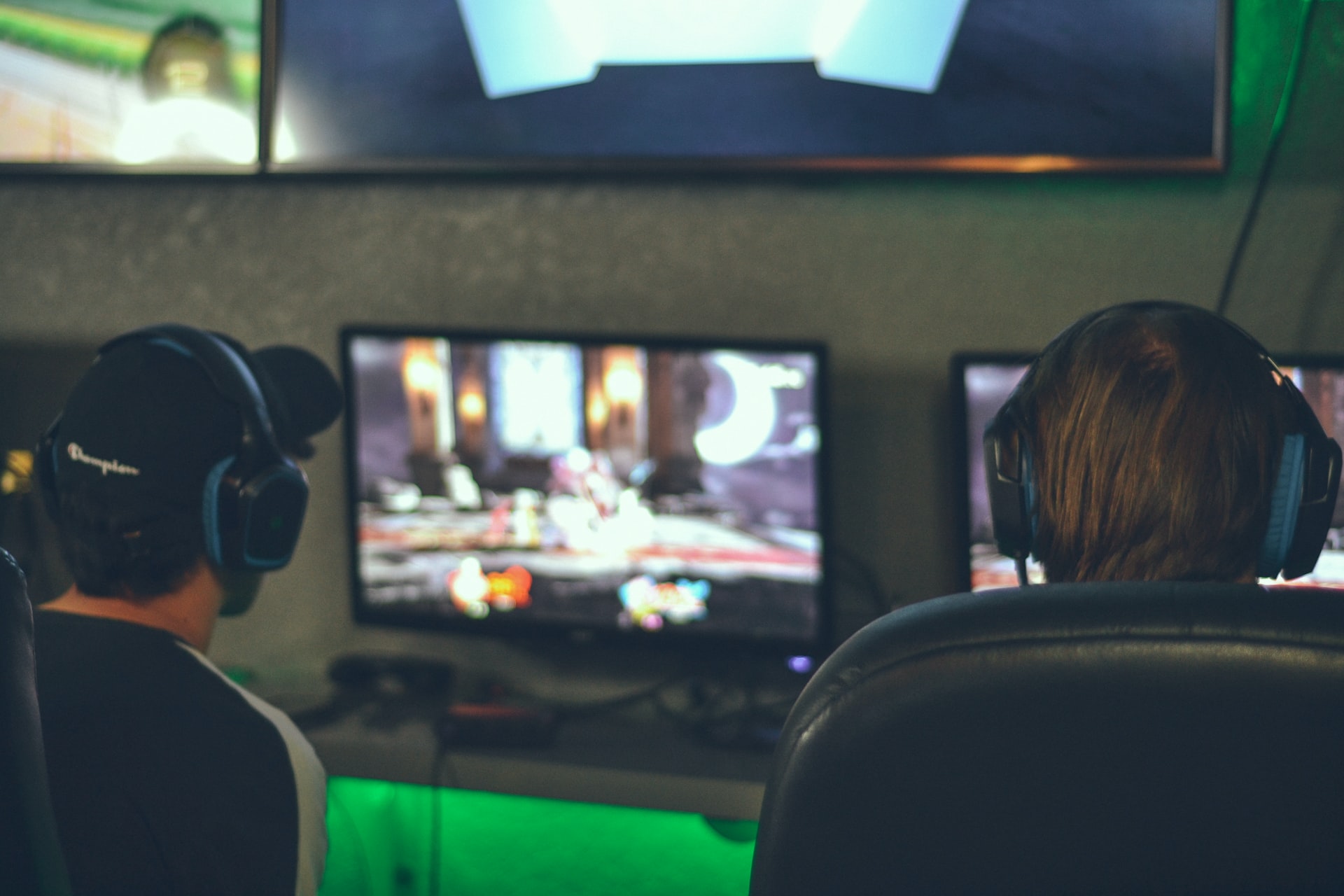Video Games: Are parents' fears justified?
Written by Theo Crowther
The Powerful Positives of Playing Video Games

It’s not just adults who enjoy playing video games. Countless children around the globe play digital games too, and parents have been asking the same question for years: will video games cause harm to my child?
The answer? Well, researchers are certainly not unanimous, but there is good cause for less alarm. The fact is there are both potential positive benefits and negative costs, when it comes to playing video games. Both formal studies and anecdotal experience reveal myriads of proven reasons why children and adults alike should enjoy playing video games. And in this blog post, I intend to shed some light on the advantages of how gaming can positively develop the brain.
Let the games begin! - Reaction Times…
Over the years studied, research has revealed that children and teens who play video games display certain positive behavioural differences compared to children who don’t engage in video games. Entrepreneur and high-functioning autist, Penelope Trunk, states in her article https://education.penelopetrunk.com/2013/07/02/this-is-what-unschooling-is/ , regarding children who game, “Research specific to video games shows largely positive effects from high engagement.” One example is measured reaction time. Video games have the potential to stimulate survival instincts in everyone, with much swifter reaction times being one outcome in regular gamers.
There are countless video games that offer the opportunity to increase one’s reaction time. One of the most common examples in this genre is First Person Shooters, or FPS games. This genre primarily originated from militaristic theming, enabling players to adopt the role of a soldier deployed in a treacherous war. With constant gunfire and explosives detonating around the player, the player is forced to be on-their-toes at all times, ready to face any threat that may suddenly present itself next. With this constant stimuli, the player’s reaction time has been proven to increase, the more they play.
Interestingly, and linked to this finding, there is a higher than average representation of gamers in military Air forces, as fighter jet pilots. Not only do fighter jet pilots train extensively by using complex video-game simulators, but there is also a correlation between the frequency of fighter jet pilots with those who gamed regularly as a child or adolescent. And expanding this point further, there are many professions in which reaction time efficiency is critical, from professional sports, to the medical profession (e.g. with respect to surgeons, who may find themselves sometimes managing patients’ life-death situations), to policing and S.W.A.T teams.
So, let’s not underestimate the value of video games simply with regards to training users in higher reaction times, though often inadvertently.
Climbing the Ladder of Accomplishment…
Another advantage that can be acquired from experimenting with video game play is determination and resolve. Rather than just relaxing in a unidirectional way, by watching a favourite TV show, or by reading a book, human beings - children especially, perhaps - are innately driven to challenge themselves, and to learn (as Peter Gray, from Freedom to Learn at Psychology Today explains). By engaging in a virtual gaming challenge, which can often be highly complex, mastery, autonomy and independence become possible, which have been proven to be key psychological needs of humans.
Think of playing a video game like climbing a ladder. You start at the bottom, and climb all the way to the top. We can apply this analogy to video games: in the gaming world, climbing the ladder translates to overcoming a challenge of some sort at every step of the challenge, before you can ‘level-up’. The further into a game you get, and the more you progress, the tougher the next challenge to solve will be. Most players will get stuck at some point, if not at multiple points, and feel exceptionally frustrated (I can confirm this, through my own experience gaming!). But it is this very frustration that sparks an ultra laser-like degree of focus and determination that is required for the gamer to overcome the problem at hand. The sense of gratification the player has after completing a difficult challenge can be immense, and for many players, that is one of the key reasons that they enjoy video games.
Furthermore, Peter Gray, Boston College’s Professor of Psychology, states that children, especially, may take pleasure and psychological benefit from playing videos, due to this sense of intrinsic reward that is part of the video game landscape. According to Gray, in current times, children’s and adolescents’ time is controlled for most of their week by a mix of parents, school and teachers, homework and extracurricular activities, to such a degree that they have very little ‘downtime’ left; it is this free time that usually enables the most profound learning to take place, through self-chosen activities and free-play, and the obstacles and psychological rewards that the player experiences. Equally, free-play, and this includes playing video games, may be one of the primary ways and only times in which a child, or young person, gets to enjoy their own sense of independence and self-control.

Squad up! …
One of the most positive benefits behind playing video games, for any age, is socialisation. Jane McGonigal, in her TED talk entitled, “Gaming can make a better world”, Gaming can make a better world | Jane McGonigal - YouTube discusses research that suggests we tend to like people better, after we play a video game with them. This makes intuitive sense. Video games are one of the most convenient ways in which to see, and interact with online friends. Picture this scene as a grand fantasy quest film, in which the player and her/his friends are the main cast.
Whatever the genre, multiplayer games immerse not just you, but also all of your gaming friends into the digital world of play at once. The majority of the time, you will all share a common goal to work towards. This creates a strong sense of teamwork, cooperation and communication skills in children, teenagers and adults alike, as the players learn to operate as a singular group with their own set of rules (sometimes which they need to make up and agree upon spontaneously, as they go through the gameplay). Players often have slightly different skill sets and strengths, in gaming groups. One friend might have a knack for solving hazardous puzzles, for example, whilst others might be more proficient in virtual combat. With so many people all working towards a common goal, the power of the team makes it almost unstoppable, at times. I personally find the act of working together in a big squad to be one of the most engaging activities I enjoy whilst playing digital games with my friends.
An Infinite World of Possibilities…
In conclusion, video games can be extremely beneficial to almost anyone who is open-minded enough to try them, especially with the vast range of games available in this huge and fast-growing sector. For years, these virtual experiences have been drawing in people of all ages from all around the globe. The primary reason? Fun! If a video game was not entertaining, after all, would you play it? Of course not. The enjoyment and discussion of video games has brought people together for several decades now, from immersion in endless virtual worlds, to the ability to play a role that you’re not fulfilling in real life. It’s clear that video games are here to stay, and that is no bad thing. The more video games that are released and played, the more we likely find out about other hidden positive benefits. And as for the naysayers, let’s not forget that previous generations were as terrified of the dangers of reading too much, and watching too much television. Yes, we should be mindful of overly-addictive gaming, and of living a balanced life offline too. But it’s likely that all of the scare-mongering is over the top.
Video games have also been truly life-changing for some people with terminal illnesses. They help enabled groups of friends to socialise in a multitude of scenarios, all without a single step out the house… which means that even if you have friends living on the opposite side of the world, you can still find time in which to play together.
I myself have learnt various skills and absorbed an abundance of information that without video games I would not have necessarily experienced. Balance is of course key - for example, you can’t ignore your relationships, socialising in-person, your work / studies, fitness or health - but settling down to enjoy some video games after a hard day's work is no bad thing, and may bring mental health rewards. If, as a parent, you monitor your child’s time usage on video games in order to ensure a healthy balance, by chatting openly, and through play and observing limits, you will be able to help educate your children with regards to how much time is ‘enough’ for them. Perhaps you might even want to try video games yourself, especially if this helps you to connect with your child or teen? Parents can use video games as a way in which to spend time bonding with their children, both working towards a common goal. So, why not get out there and try it? There is an entire world ahead of you, waiting for you to explore it.
Resources:
Gaming can make a better world | Jane McGonigal - YouTube
The transformative power of video games | Herman Narula
https://education.penelopetrunk.com/2013/04/11/kids-who-play-video-games-do-better-as-adults/

